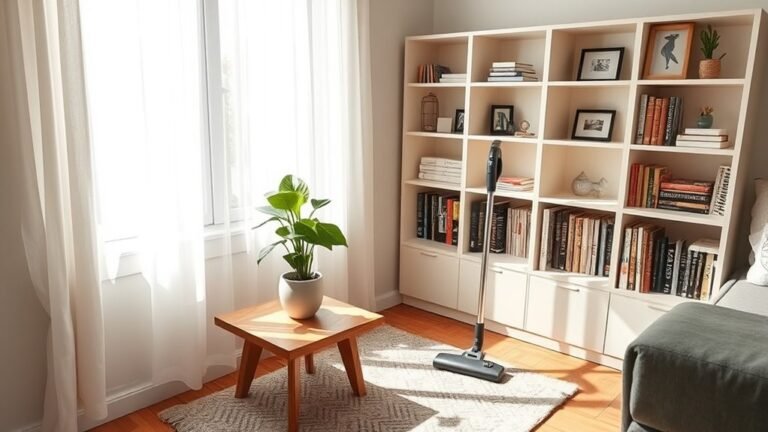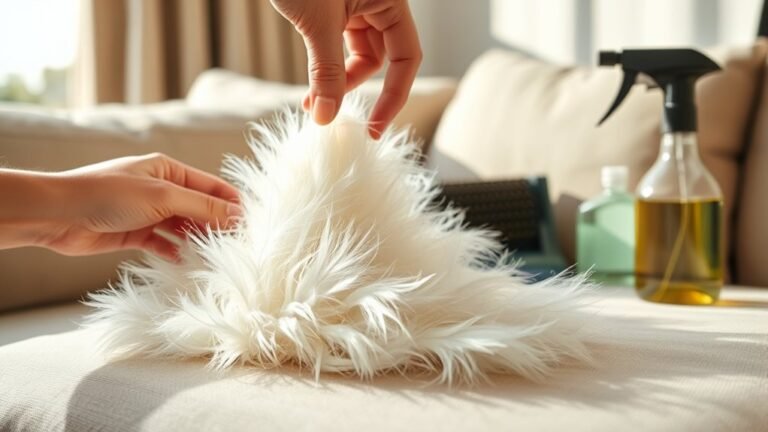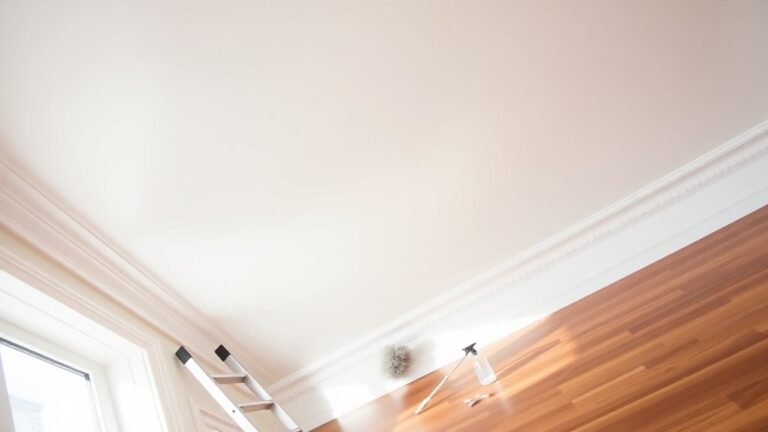Natural Cleaning Hacks for Your Couch
You can keep your couch fresh and spotless using natural cleaners like baking soda and vinegar, which lift stains and neutralize odors without harsh chemicals. Adding a few drops of essential oils provides a pleasant, antimicrobial scent safe for families and pets. For leather, a simple mix of water and vinegar with conditioning works wonders. Regular vacuuming and cushion rotation prevent wear and dirt buildup. Stick around to discover easy homemade sprays and prevention tips that extend your couch’s life.
Benefits of Using Natural Cleaners on Upholstery

Although synthetic cleaners might seem effective, using natural cleaners on your upholstery offers several key benefits. When you choose eco friendly options, you’re not only protecting the environment but also reducing exposure to harsh chemicals that can degrade fabric fibers. This means your couch stays fresher and lasts longer, supporting upholstery longevity. You’ll appreciate the freedom of knowing your cleaning routine is safe for your family and pets, without compromising on cleanliness. Plus, natural cleaners often come with fewer health risks like allergies or irritations, so you can relax fully on your couch. Embracing these gentle, effective methods empowers you to maintain a clean living space while honoring your values of sustainability and health. It’s a choice that gives you control and peace of mind.
How to Remove Stains With Baking Soda and Vinegar
You can tackle stubborn couch stains using just baking soda and vinegar, two natural ingredients that work wonders. Baking soda helps absorb odors and lift dirt, while vinegar breaks down stains effectively without harsh chemicals. I’ll show you how to apply them properly and let your couch dry for the best results.
Baking Soda Benefits
Baking soda is a powerhouse when it comes to tackling stubborn couch stains. Its natural cleaning benefits make it a must-have for anyone craving a fresh, stain-free couch without harsh chemicals. You simply sprinkle baking soda on the stain, let it sit to absorb odors and lift dirt, then vacuum it away. This easy step frees you from stubborn messes while keeping your space healthy.
| Benefit | How It Works | Why You’ll Love It |
|---|---|---|
| Odor Neutralizer | Absorbs and eliminates odors | Keeps your couch smelling fresh |
| Stain Lifter | Breaks down dirt particles | Removes stains gently |
| Non-Toxic Cleaner | Safe for family and pets | Peace of mind while cleaning |
Vinegar Stain Removal
Combining vinegar and baking soda creates a powerful stain-fighting duo that tackles even the toughest couch messes. When you mix these two, the vinegar effectiveness shines by breaking down stubborn stain types like coffee, wine, or pet accidents. You start by sprinkling baking soda over the stain to absorb moisture and loosen grime. Then, pour a small amount of vinegar over it, letting the fizzing action lift the dirt away. This natural reaction not only cleans deeply but also neutralizes odors, giving your couch a fresh feel without harsh chemicals. Embracing this simple combo lets you keep your space clean and free, maintaining your couch’s beauty with ease and confidence. It’s a liberating, eco-friendly way to handle stains on your terms.
Application and Drying
Although it may seem simple, applying baking soda and vinegar correctly is key to effective stain removal on your couch. Start by sprinkling baking soda evenly over the stain, letting it sit for about 15 minutes. Then, use a spray bottle to lightly mist white vinegar onto the baking soda—this creates a fizzing action that lifts the stain. Be sure to use gentle application methods to avoid soaking your fabric, which can cause damage.
For drying techniques, avoid direct sunlight or heat, which might fade or warp your couch. Instead, open windows or use a fan to speed up air circulation. Once dry, vacuum the residue to reveal a fresh, clean surface. These simple steps give you freedom from stubborn stains without harsh chemicals.
Using Essential Oils to Freshen Couch Fabrics
You can easily freshen up your couch fabrics using essential oils, which not only add a pleasant scent but also have natural antibacterial properties. Some of the best oils for fabric include lavender, eucalyptus, and tea tree, each offering unique benefits. To get the most out of them, you’ll want to learn a few application tips and tricks that keep your couch smelling great without damaging the material.
Benefits of Essential Oils
When your couch starts to smell a bit stale, essential oils can be a simple and natural way to refresh the fabric. You get to choose from a variety of essential oil blends that match your mood and style, allowing you to create a personalized scent profile that breathes new life into your living space. Plus, essential oils are chemical-free, making them a safe choice for your family and pets.
| Benefit | Description |
|---|---|
| Natural Freshness | Eliminates odors without harsh chemicals |
| Customizable Scents | Mix essential oil blends to suit your taste |
| Antimicrobial | Helps reduce bacteria and allergens |
| Eco-Friendly | Biodegradable and sustainable option |
Using essential oils means freedom from synthetic fragrances while keeping your couch inviting.
Best Oils for Fabric
Picking the right oils can make all the difference in keeping your couch smelling fresh and inviting. When choosing oil types for your couch fabric, consider natural options like lavender, eucalyptus, and lemon. Lavender offers a calming scent, perfect for relaxing spaces, while eucalyptus brings a revitalizing, clean aroma. Lemon’s bright, citrusy notes cut through odors and add a burst of energy. These oils not only freshen the air but are gentle on fabric, avoiding harsh chemicals. Always pick pure essential oils to maintain your couch’s integrity and your freedom from synthetic fragrances. By selecting the best oils for fabric, you can enjoy a naturally fresh couch that welcomes you without overpowering your space.
Application Tips and Tricks
A few simple steps can transform how you apply essential oils to your couch, ensuring a fresh scent without damaging the fabric. When diving into fabric care, these cleaning techniques help you maintain freedom from harsh chemicals while keeping your couch inviting.
- Dilute essential oils with water or a gentle carrier like witch hazel to prevent fabric damage and uneven scent.
- Test a small, hidden area first to check for colorfastness or fabric reaction before full application.
- Use a spray bottle for even distribution, lightly misting your couch and allowing it to air dry to avoid moisture buildup.
Steps for Cleaning Leather Couches Naturally
Although leather couches are durable, they still need gentle care to stay looking their best. Start by dusting your couch with a soft cloth to remove loose dirt. Next, mix equal parts water and white vinegar in a spray bottle for a natural cleaner. Lightly mist the surface and wipe with a microfiber cloth, avoiding saturation. After cleaning, apply a natural leather conditioner to nourish the leather—this helps maintain suppleness and extends your couch’s life. Remember, leather conditioner benefits include preventing cracks and restoring shine without harsh chemicals. If you prefer, explore natural leather alternatives like plant-based or vegan options that require similar gentle care. By following these steps, you’ll keep your leather couch fresh and free from synthetic cleaners, embracing a natural, liberating approach to home care.
Tips for Maintaining Fabric Sofas Without Chemicals

Caring for leather couches naturally sets a great example for how you can treat fabric sofas without relying on chemicals. When it comes to fabric care, simple maintenance tips can keep your sofa fresh and vibrant while letting you enjoy freedom from harsh substances.
Natural care for leather inspires gentle, chemical-free maintenance for fabric sofas, keeping them fresh and vibrant.
- Vacuum Regularly: Use a brush attachment to remove dust and debris, preventing buildup that dulls fabric.
- Spot Clean Immediately: Blot spills with a clean cloth and use mild, natural solutions like diluted vinegar to avoid stains.
- Rotate Cushions: Flip and rotate cushions often to distribute wear evenly, maintaining your sofa’s shape and comfort.
Homemade Upholstery Cleaning Sprays You Can Make
If you want to keep your upholstery fresh without harsh chemicals, making your own cleaning sprays is a simple and effective solution. You’re free to choose homemade recipes using natural upholstery ingredients like white vinegar, baking soda, and essential oils. For instance, mix equal parts water and white vinegar with a few drops of lavender oil to create a gentle spray that lifts dirt and refreshes fabric. Another easy recipe combines water, a teaspoon of mild liquid soap, and a splash of lemon juice for a light, effective cleaner. These sprays let you control what touches your couch, avoiding toxins and embracing freedom in your cleaning routine. You’ll appreciate how easy and affordable these homemade sprays are, keeping your upholstery spotless and naturally cared for.
Natural Methods to Eliminate Odors From Your Couch

When odors settle into your couch, tackling them naturally can be both safe and effective. You don’t have to rely on harsh chemicals to freshen up your space. Try these couch deodorizing techniques to regain control over your home’s atmosphere:
- Baking Soda Sprinkle: Liberally sprinkle baking soda on your couch, let it sit for 15-20 minutes, then vacuum thoroughly. It absorbs odors without masking them.
- Vinegar Mist: Mix equal parts water and white vinegar in a spray bottle. Lightly mist your couch and allow it to air dry—vinegar neutralizes unwanted smells naturally.
- Essential Oil Diffuser: Use natural scent boosters like lavender or eucalyptus oils on a diffuser nearby or add a few drops to the baking soda before sprinkling for a subtle, clean fragrance.
These simple methods keep your couch smelling fresh while respecting your freedom to choose natural solutions.
Preventative Care for Keeping Your Couch Spotless
Keeping your couch smelling fresh is just one part of maintaining its overall cleanliness. To truly keep your couch spotless, focus on preventative care. Regular couch maintenance, like vacuuming crumbs and dust, prevents buildup that can stain or damage fabric. Use natural fabric protection methods, such as applying a homemade mixture of water and white vinegar, to repel spills before they soak in. Avoid eating or drinking on your couch to minimize accidental messes. Rotate cushions regularly to guarantee even wear and keep your couch looking its best. By taking these simple steps, you’ll extend your couch’s life and enjoy a clean, inviting space without feeling tied down by constant deep cleaning. Freedom comes from effortless upkeep!
Frequently Asked Questions
Can Natural Cleaners Damage Delicate Couch Fabrics?
You might wonder if natural cleaners can damage delicate fabric types. While they’re generally gentler than harsh chemicals, you’ve got to be careful with how you use cleaning methods. Some fabrics like silk or velvet react differently, so testing on a small, hidden spot first is smart. You want to enjoy the freedom of using natural products without risking your couch’s look, right? Always choose methods that suit your specific fabric type.
How Often Should I Deep Clean My Couch Naturally?
Imagine your couch as a loyal old tree, standing strong through seasons. For its health, you wouldn’t let the soil go untouched too long. Similarly, your couch maintenance calls for deep cleaning every six months or so, balancing cleaning frequency to keep it fresh without overdoing it. This rhythm lets you enjoy freedom from grime without stressing delicate fabrics, ensuring your comfy retreat stays inviting and vibrant for all your relaxing adventures.
Are Natural Cleaning Methods Safe for Pet Owners?
Yes, you can absolutely use natural cleaning methods that are safe for pet owners like you. Choosing pet safe ingredients means avoiding harsh chemicals, so your furry friends stay happy and healthy. Non toxic alternatives like vinegar, baking soda, and gentle essential oils work wonders without risking your pets’ well-being. You’ll enjoy a fresh, clean home while giving your pets the freedom to roam without any worries.
Can I Use Natural Cleaners on Couch Cushions With Foam Filling?
Ever felt the panic when a spill threatens your comfy cushion? You can absolutely use natural cleaners on foam-filled couch cushions, but with care. Foam stain removal calls for gentle, moisture-light methods to avoid damage or mold. Opt for diluted vinegar or baking soda pastes to lift stains without harsh chemicals. Remember, cushion care means treating your couch like a cherished friend—freeing you from worries while keeping it fresh and cozy.
What Natural Ingredients Should Be Avoided on Antique Upholstery?
When caring for antique upholstery, you’ll want to avoid natural ingredients like vinegar and baking soda. Vinegar risks damaging delicate fibers and causing discoloration, while baking soda concerns stem from its abrasive nature, which can wear down vintage fabrics over time. To keep your treasured pieces safe, stick to gentle, pH-neutral cleaners or consult a professional. That way, you’ll preserve their beauty without feeling restricted in your cleaning choices.






